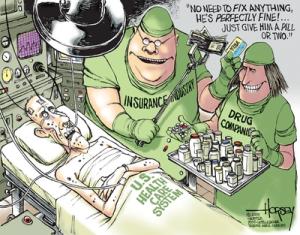- MENU
- HOME
- SEARCH
- WORLD
- MAIN
- AFRICA
- ASIA
- BALKANS
- EUROPE
- LATIN AMERICA
- MIDDLE EAST
- United Kingdom
- United States
- Argentina
- Australia
- Austria
- Benelux
- Brazil
- Canada
- China
- France
- Germany
- Greece
- Hungary
- India
- Indonesia
- Ireland
- Israel
- Italy
- Japan
- Korea
- Mexico
- New Zealand
- Pakistan
- Philippines
- Poland
- Russia
- South Africa
- Spain
- Taiwan
- Turkey
- USA
- BUSINESS
- WEALTH
- STOCKS
- TECH
- HEALTH
- LIFESTYLE
- ENTERTAINMENT
- SPORTS
- RSS
- iHaveNet.com
by Rich Umbdenstock

America's Hospitals Can't Afford Healthcare Cuts Obama, Congress Are Considering: They're suffering already
Rich Umbdenstock is president and CEO of the American Hospital Association.
It promises to be a very hot summer in Washington as the health reform debate takes center stage and various options are discussed.
We must not lose sight of the fact that we will need good policy changes -- not just payment cuts -- if we hope to find long-term solutions to the healthcare challenges vexing America: 46 million uninsured, an aging population, an epidemic of obesity and chronic disease and the need for a more coordinated system of care.
The men and women working in America's hospitals see the challenges we face and the opportunities for change that are needed. Providing coverage to our nation's uninsured is vitally important and a goal that hospitals support strongly. And there are reforms that must take place: lasting changes that emphasize wellness and prevention; removing the barriers to hospitals, physicians, nurses, and other caregivers to working together to better coordinate care for patients; and allowing caregivers to remain focused on improving patient care -- not on navigating a complex, red tape-ridden system. And the best part about these solid policy changes is that they all have associated cost savings.
These are the changes hospitals strongly support.
What hospitals cannot support, and hospitals cannot sustain, are budget cuts on the magnitude of nearly a quarter trillion dollars.
Cuts in the government programs that serve our nation's seniors, disabled, poor, and children to the levels that are being discussed would put in jeopardy the many services on which communities rely. Specifically, gutting the Disproportionate Share Hospital programs under Medicare and Medicaid as President Obama recently proposed -- programs designed to help hospitals care for large numbers of uninsured and that help make up for government underfunding -- and doing so before coverage has been activated could threaten further the ability of hospitals to provide care.
For those hospitals that will continue to care for large numbers of Medicaid patients, these reductions will have a devastating impact.
Blunt cuts are not the reform our nation needs.
Hospitals recognize and agree that care must become more affordable, and hospitals are taking steps within their organizations -- without legislation -- to do their part to make changes that improve patient care and save costs. We applaud these hospitals and are working to spread their learnings throughout the nation.
Make no mistake -- many of America's hospitals will not be able to withstand the cuts that the administration and the Congress are considering.
They already are experiencing increases in charity care and nonpayment for services as the economic downturn affects more and more Americans and their employer-provided insurance coverage. The public will judge reform efforts on whether such changes improve care for themselves and their families and will support the organizations and caregivers they depend upon to deliver needed healthcare.
We urge the administration and Congress to adopt thoughtful reform that addresses the underlying challenges our nation faces.
Our communities and patients depend upon it.
WORLD | AFRICA | ASIA | EUROPE | LATIN AMERICA | MIDDLE EAST | UNITED STATES | ECONOMICS | EDUCATION | ENVIRONMENT | FOREIGN POLICY | POLITICS
America's Hospitals Can't Afford Healthcare Cuts Obama, Congress Are Considering: They're suffering already
If there were a Straight Talk Express for health economists, Princeton professor Uwe
Reinhardt would be the engineer. Born in Germany and raised in Canada, Professor Reinhardt has personally experienced medical systems in different
countries. Over the past 25 years, he has become a critical voice in the debate about reforming America's healthcare system